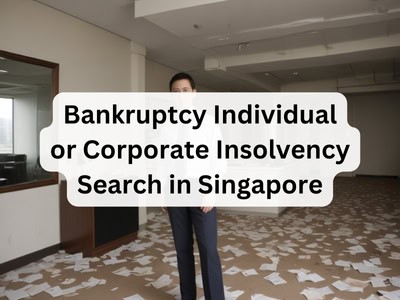This post is also available in:
![]() 简体中文 (Chinese (Simplified))
简体中文 (Chinese (Simplified))
A Guide to Understanding Bankruptcy and Corporate Insolvency Searches in Singapore for Individuals and Companies
A bankruptcy or corporate insolvency search in Singapore can be carried out on Individual or Company by anyone. But what are these searches about?
The Difference Between the Two
 Bankruptcy searches are done by individuals. When a bankruptcy search is carried out in Singapore, it is usually done by any individual who wants to determine if they are otherwise bankrupt or not. The Singapore High Court considers any individual unable to repay more than $15,000 in debt bankrupt.
Bankruptcy searches are done by individuals. When a bankruptcy search is carried out in Singapore, it is usually done by any individual who wants to determine if they are otherwise bankrupt or not. The Singapore High Court considers any individual unable to repay more than $15,000 in debt bankrupt.
Companies keen to determine their liquidation status in Singapore would perform the corporate insolvency search. This search is carried out by companies who have been forced to wind up by the court. In this context, any organisation unable to fulfil their financial obligations to creditors are categorised under “insolvency”.
Both searches can be performed by anyone. This means that creditors, employers, investors and even employees can conduct this search if they wanted. Individuals can perform searches on themselves on companies and vice versa.
Why Conduct a Bankruptcy or Corporate Insolvency Search?
Since both searches can be performed by anyone, each category would have their own reasons for conducting this search:
- Investors – This group is likely to perform the corporate insolvency search on companies. They may do this to confirm that a company has not been served with a winding up notice.
- Creditors – Before lending money to any individual, a creditor may perform this check to determine their suitability.
- Employers – Before hiring a prospective employee, employers in Singapore might perform a bankruptcy or corporate insolvency search. This enables them to make an informed decision about the suitability of the candidate. Employers may also choose to do this search when assessing the suitability of existing employees for a promotion. This is a necessary precaution since bankrupt individuals require the High Court’s permission. Otherwise, they will not be able to act as a director for any organisation.
- Employees – An individual employee or job application may want to conduct the insolvency search before joining a company.
How the Bankruptcy or Corporate Insolvency Search Is Done in Singapore?
Should you need to, this search may be performed online through the e-services offered by the Ministry of Law Insolvency Office. If you belong to an organisation with granted partner access, you can do the search through the “Partners” option. You will need a SingPass to log in.
To execute the bankruptcy or corporate insolvency search, you need to provide the following information:
- Bankruptcy Searches – Identification or bankruptcy number of the individual.
- Corporate Insolvency Search – The Unique Entity Number (UEN) or winding up reference number of the organisation.
Online bankruptcy searches will incur a fee of $6 per search result that you wish to access. The fee applies whether your results are positive or not. The fee is applicable to both individuals and corporations.
Payment options for the bankruptcy or corporate insolvency search in Singapore can be done through the following channels:
- Visa (credit or debit)
- MasterCard (credit or debit)
- eNETS direct debit
How Long Are the Search Results Kept?
If your bankruptcy order has been discharged or annulled for more than 5 years, it will be deleted. Public databases only contain undischarged bankrupt records. You name may be on the permanent bankruptcy record if:
- You have been discharged bankrupt despite not paying your target contribution in full after 7-year’s (first-timers); or
- You have been discharged bankrupt despite not paying your target contribution in full after 9-year’s (repeat bankrupts)
Corporate insolvency search records will remain accessible to the public.
What Happens After the Search?
After the search has been done, the following groups may carry out these next steps:
- Employers – May reconsider hiring a candidate. If it involves an existing employee, the employer may want to review the scope of duties.
- Creditors – May decline loan applications, or choose to offer the loan under more onerous terms.
- Investors – May want to reconsider investing in the company.



